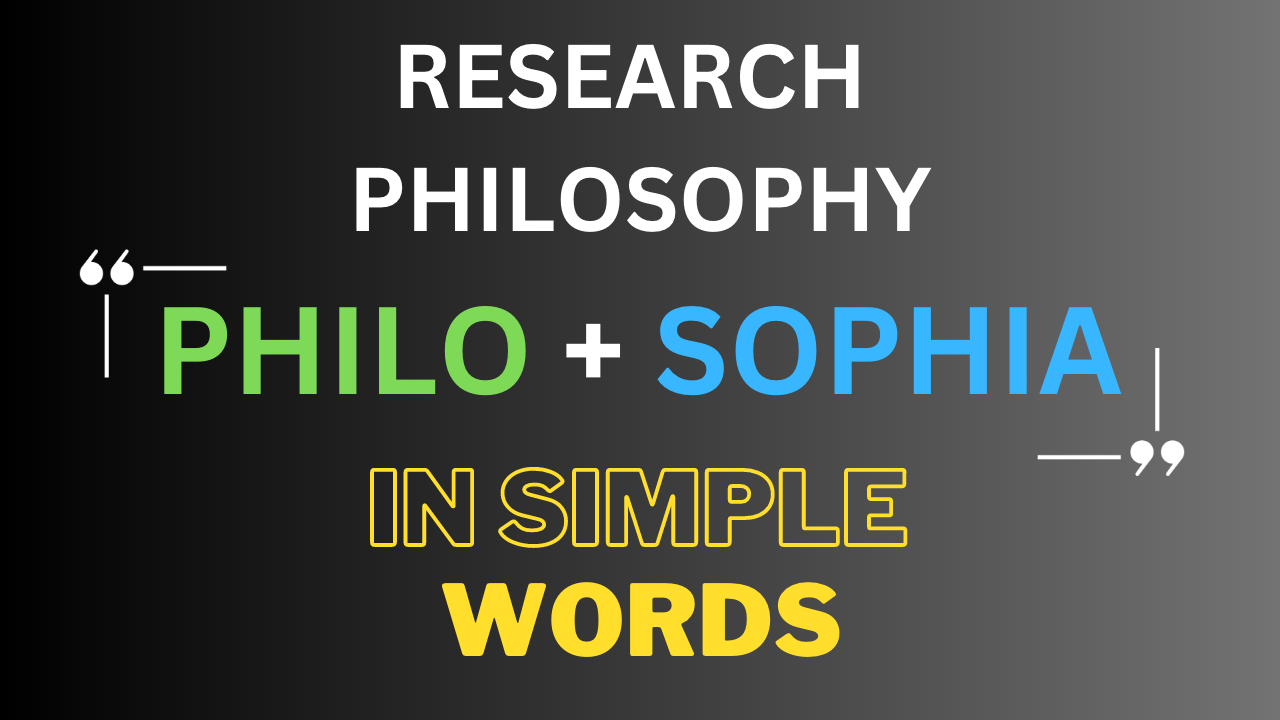Understanding research philosophy for Masters and PhD students.
Understanding research philosophy is an essential aspect of research methodology. Have you ever wondered about the meaning of Ontology or what is objectivism and subjectivism in research philosophy? This philosophical concept has been a topic of discussion among scholars and intellectuals for a long time. The debate between Objectivism and Subjectivism is at the core of Ontology. Objectivism asserts the existence of objective reality and believes that knowledge and truth can be discovered through reason and observation.
In contrast, Subjectivism claims that reality is subjective, and knowledge and truth depend on individual perceptions and experiences. This debate has far-reaching implications in various fields, such as ethics, epistemology, and metaphysics. While Objectivists advocate for a universal and objective understanding of reality, Subjectivists emphasize individual perspectives and experiences. The ongoing philosophical discourse between these two schools of thought is an intriguing and thought-provoking topic in social research.
Questions Answered: What is philosophy in simple words? | What are the three types of philosophy? | What is an example of a philosophy? | What makes a person a philosopher?
If you are writing a dissertation or PhD thesis and want to understand research philosophy, the video below is for you. In this, I talked about the basic understanding and tried to simplify the understanding of research philosophy, (ontology, epistemology, and axiology) and how you choose or define the right Philosophy for your scientific or social research.
Video: What is Research Philosophy? Watch: What is the philosophy of scientific research?
Types of Research Philosophy
So let’s start with the research philosophy. In research philosophy, there are three branches one is ontology the second one epistemology, and the third one is axiology. But before discussing those three branches, ontology, epistemology and axiology, we need to understand the philosophical foundation of research.
Philosophia (Philosophy) is a Greek word that is formed with two names, PHILO and SOPHIA. ‘Philo’ means ‘love’, and Sophia means ‘knowledge’, so the meaning of philosophia is the love of knowledge.
So jointly, Phil and Sophia, love and knowledge become the love of knowledge, which is why the people who love knowledge are called philosophers. The people who try to search for actual knowledge is a philosophers. The realistic research philosophy is, where the word came from now. As we discussed earlier, research philosophy has three main branches. Those three branches of research philosophy and paradigm are ontology, epistemology and axiology. So let’s talk about these three branches one by one. Well, let me say that philosophy is beloved of knowledge, so the person who loves knowledge and searches for knowledge is called a philosopher.
So far, the meaning of philosophy now, what we have learned in the above video, is that philosophy is formed by two words, Phil and Sophie; Phil means knowledge, and Sophie means love, so Philosophy means the love of knowledge. The person we call a philosopher is a person who has a love for knowledge. Philosophy has three branches one is ontology, the second one is epistemology, and the third one is Axiology. Ontology is a branch of philosophy that deals with the nature of existence and reality. It examines the categories and concepts that describe the world and seeks to understand their relationships.

In other words, ontology concerns questions such as “What is real?” and “What exists?” and attempts to provide answers through careful analysis and reasoning. For example, an ontology related to business management might include concepts such as organizational structure, leadership styles, and business processes, and specify how they relate. For example, it could describe how different leadership styles affect the effectiveness of different business processes, or how changes in the organizational structure can impact the overall performance of the business.
However, for more details, let’s see What is Ontology?
Philosophy in Qualitative Research
It is important to understand a qualitative research philosophy clearly when conducting qualitative research. This philosophy should guide the design and execution of the research, as well as the interpretation of the results. In quantitative research, the research philosophy is typically positivist, which means that it is based on the idea that there is an objective reality that can be measured and studied. This philosophy emphasizes using empirical data and statistical analysis to test hypotheses and draw conclusions. Being transparent about your research philosophy and methodology is important to ensure your research is rigorous and credible.
Philosophy in Quantitative Research
In contemporary research, the importance of quantitative methods cannot be overstated. However, the role of research philosophy in qualitative research is often overlooked. Philosophical concepts, such as ontology and epistemology, are fundamental to understanding the underlying assumptions and biases that influence the research process. Researchers can ensure their findings are accurate and reliable by critically examining these assumptions. Furthermore, philosophy can help researchers understand the ethical implications of their work and ensure that their research is conducted fairly and justly. Overall, a deeper understanding of the role of philosophy in quantitative research can lead to more rigorous and ethical scientific inquiry.
-

Transforming Business and Life with Lean Tools
The Art of Lean Living. Transforming Business and Life with Lean ToolsLean Living principles, including Lean Methodology, Just-in-Time Production, Value Stream Mapping, Overall Equipment Effectiveness, Continuous Improvement, Error Proofing, Root Cause Analysis, 5s System, Six Sigma, SMED, Total Productive Maintenance, Hoshin Kanri, Gemba, and Andon. It explains their applications and techniques for both business and… Read more
-

The Impact of Big Data on Supply Chains
Big Data on Supply Chain Over the years, supply chain management has evolved from traditional methods of handling activities within business operations to more advanced approaches. Technological advancement has enabled the growth of the supply chain today. With the aid of technology, we can deliver more products and services to customers in good time. IncreaseThe… Read more
-

Embracing Occult Management: A Game-Changer in Modern Business
Occult management is an innovative approach that marries the esoteric wisdom of occult traditions with the practicalities of modern management. The occult, often misunderstood, refers to a deeper knowledge of the hidden aspects of life and the universe. It’s about tapping into intuition, understanding the metaphysical, and harnessing inner wisdom. When these elements are integrated… Read more
-
Exploring the Latest Trends in Supply Chain Management
Latest Trends in Supply Chain Management Supply chain management is a dynamic field that is constantly evolving to meet the changing needs of businesses and consumers. In recent years, several trends have emerged that are reshaping the way companies manage their supply chains. These trends are driven by technological advancements, changing consumer expectations, and theExploring… Read more
-

Supply Chain 5.0: Key Trends of Logistics
Supply Chain 5.0 is set to revolutionize the future of logistics, bringing forth a new era of efficiency and innovation. With advancements in technology such as artificial intelligence, blockchain, and the Internet of Things, supply chains will become more interconnected, transparent, and responsive. This excerpt explores key trends that will shape the supply chain landscape… Read more
-

China’s Export Restrictions on Rare Earth Elements: Impacts on Global Supply Chains
Emphasizing the need for agility and forward-thinking, this situation prompts us to reconsider our supply chain strategies and leverage potential openings to strengthen our global economic landscape. Read more




